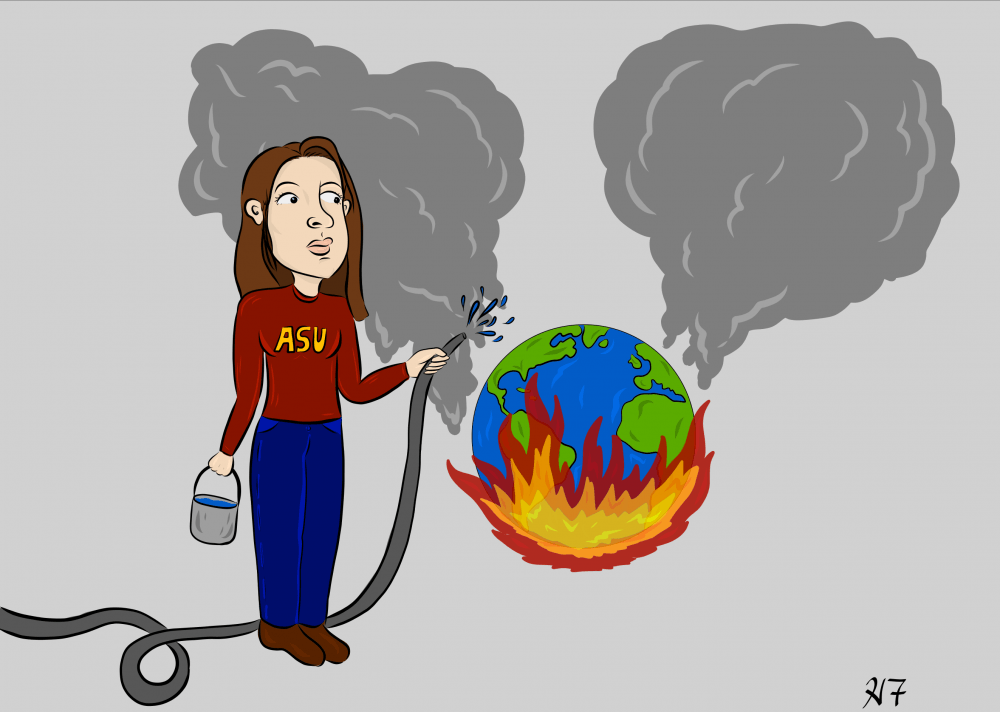In an age of frequent natural disasters, liquefying glaciers and dramatic political oscillation, many millennials are uncertain of what the future holds.
According to the Yale Program on Climate Change Communication, a significant number of registered voters in the U.S. want more to be done about climate change. Nevertheless, 89 percent of Americans polled reported never contacting government officials to take action on climate change. But some Arizona organizations are trying to change that.
In an effort to teach younger generations how to take political action on environmental issues, the Arizona chapter of Defend our Future, a national non-partisan environmental non-profit, hosted a screening and discussion of a new Discovery Channel documentary on Monday, Oct. 2.
The film, "Rancher, Farmer, Fisherman," depicts the struggles of individuals from various facets of the agriculture industry who are taking action to protect their livelihoods by changing policy at a local and state level.
Defend our Future is focused on informing young adults about how to become civically engaged in order to prevent funding cuts to the Environmental Protection Agency.
“We are solely focusing on student engagement and climate change, particularly around the EPA's proposed budget cuts,” Nick Petrusek, Arizona's regional campus director for Defend our Future, said. "A lot of what we are doing is not only events like this, but also focusing on signing up students, getting their information and letting them know how to contact John McCain and Jeff Flake and say they don’t support budget cuts to the EPA."
In addition to protecting the EPA's budget, Defend our Future is also advocating getting the agency more money.
“We are very much on the defensive, and I think there’s a lot that can be done on the offensive, particularly within communities on a more local level,” Petrusek said.
The event was hosted in collaboration with two ASU environmental organizations, Citizens Climate Lobby at ASU, and Chispa ASU.
CCLatASU is an international organization which lobbies for non-partisan action on climate change. It seeks to inform and inspire students to take action towards climate change at a local level.
“All of us do non-partisan lobbying for action on climate change, so we try to find ways that people can take action on climate no matter what their political backgrounds or beliefs are,” Joseph Karas, materials science and engineering graduate student and the head of CCLatASU, said. “We train people on how to talk to members of Congress about climate, we write letters to the editor and we do tabling events and outreach stuff such as the film screening."
The organization’s primary focus is to educate students on how they can take action, but it is also interested in specific policy changes.
It seeks to enact the Carbon Fee and Dividend policy. The intent of this policy is to reduce carbon dioxide emissions by charging companies extracting fossil fuels. The companies would be charged based on the amount of carbon dioxide present in fossil fuels when they are removed from the earth.
These fees would increase over time, until the amount of carbon dioxide being released has reached a safe and manageable level. The money from these fees would then be returned to each American citizen as a dividend from the government.
CCLatASU is excited about the Carbon Fee and Dividend system because they believe it is a non-partisan initiative that both Republicans and Democrats can get behind.
Veronica Monge, a senior criminology and criminal justice student, launched Chispa ASU. The club's goal is to support the action of Chispa Arizona, the Arizona chapter of a multi-state organization that is fighting to improve the health of communities through green energy.
“Chispa ASU is supporting Chispa Arizona’s campaign, called Clean Buses for Healthy Niños, which is to reduce the pollution here in Phoenix,” Monge said.
Chispa's campaign is to convert diesel school buses that are currently being used to electric. Chispa asserts that many children in disenfranchised communities are experiencing respiratory illness, which may be a result of the polluted air emitted by these buses.
The organization is pushing for the state to fund this project using the $57 million Arizona is receiving from a federal settlement with Volkswagen, which mandates that this money be used for initiatives that improve air quality.
“We want people to get involved so they know that we do have a strong voice and we really do care about our environment,” Monge said. “We need to get more engaged and involved in those issues to protect our Mother Earth. Without health or environment, there is no life.”
Reach the reporter at snnoudal@asu.edu or follow @seannoudali on Twitter.
Like State Press on Facebook and follow @statepress on Twitter.




